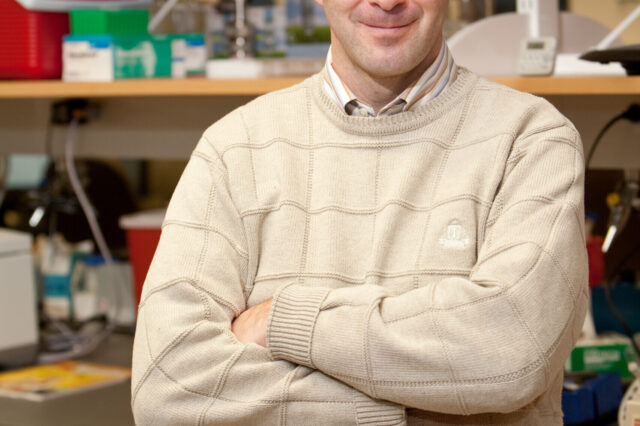UF collaboration will generate novel approaches to Alzheimer’s disease research

University of Florida Health researchers and their colleagues will receive up to $7.7 million in funding over five years from the National Institutes of Health to use large data sets in humans and animals to speed up the process of finding therapies for Alzheimer’s disease.
The grant is part of a $45 million NIH initiative from the Office of the NIH Director with additional funding from the National Institute on Aging, the lead institute within NIH for Alzheimer’s research.
“There is a huge unmet need with Alzheimer’s disease,” said Todd Golde, M.D., Ph.D., director of the UF Center for Translational Research in Neurodegenerative Medicine. “The economic costs for Alzheimer’s disease are now higher than those of heart disease and cancer, and as there are no therapies that modify the course of the disease, this is a devastating disorder for both patients who suffer from it and their families. With this grant, we hope to accelerate the discovery of possible disease-modifying therapies.”
The UF researchers are collaborating with colleagues at The Mayo Clinic Florida and the Institute for Systems Biology in Seattle to combine large data sets from humans and mouse models of the disease and then use the results to look at patterns that point to potential therapies.
“We are pleased that Dr. Golde’s team will be part of this national initiative,” said David S. Guzick, M.D., Ph.D., senior vice president for health affairs and president of UF Health. “Dr. Golde joined us in 2010 as part of our strategic plan to build on our existing strength in neuroscience and the McKnight Brain Institute and enhance our collaborations both within the university and with other institutions. This grant speaks to depth and breadth of the research program developed by Dr. Golde.”
During the first year of the NIH grant, they plan to generate RNA sequences for every gene expressed in the human brain using 700 brain samples from 350 subjects. Then they will have data to compare with similar work done in mouse models to see where similarities and differences might be found.
The investigators will focus on how genetic alterations to the innate immune system ― the cells and mechanisms the body uses to fight potential microscopic invaders ― may be implicated in Alzheimer’s disease. Once they have identified these genetic alterations based on the data they generate, they can manipulate these pathways in mouse models with parallel pathologies to see how changes to the innate immune system might change the disease process. The big data approach will allow the researchers to more quickly target areas of potential interest.
“If you liken this project to creating a new road map, we will have laid down half the map in the first year,” Golde said. “During year two, we will be completing the map, learning to drive and figuring out the best route to take toward therapeutic solutions. At the end of five years, we hope to have advanced one to three targets for possible therapies.”
The team will be granted $1.6 million for fiscal year 2013, with the potential of $7.7 million over the course of five years.
Golde is director of the Center for Transitional Research in Neurodegenerative Medicine, a professor of neuroscience in the College of Medicine and is affiliated with the Evelyn F. and William L. McKnight Brain Institute of the University of Florida.
This research is supported by the National Institute on Aging grant AG 046139-01.
For media inquiries contact: Marilee Griffin at 352-273-7891 or email margri@ufl.edu